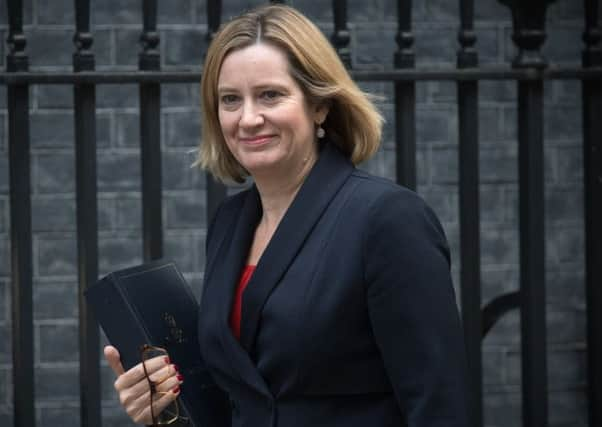Amber Rudd's decision to send home Americans in Scotland upheld


Lady Carmichael ruled that the Conservative politician didn’t act unlawfully when she ruled that Russell and Ellen Felber didn’t meet legal requirements to remain in Scotland.
Advocate Alan Caskie told judge Lady Carmichael in May 2017 that Ms Rudd should have allowed the New Yorkers to remain at their home in Inverness.
Advertisement
Hide AdAdvertisement
Hide AdThe Court of Session heard Mr Caskie argue on Thursday that the couple, who run a B&B in the city, originally came to Scotland in 2011 on a so called entrepreneur visa.
The Felbers had fallen in love with the highlands during holidays here and wanted to spend their time here. They spent hundreds of thousands of pounds renovating a guest house in the city which had attracted rave reviews and awards.
However, the court heard that the Home Secretary decided not to grant them indefinite leave to remain in the UK last year.
The politician made the decision after applying rules which were made in 2014 regarding the numbers of employees that people on entrepreneur visas had to employ
The court heard that the Home Secretary believed that Mr Felber hadn’t created enough jobs during their time in Scotland.
His lawyer argued that the Home Secretary should have applied her discretion and allowed the Felbers to remain in Inverness.
On Thursday, Lady Carmichael issued a written judgement at the Court of Session in which she concluded that the Home Secretary acted correctly.
She wrote: “The court’s function will usually be limited to reducing a decision that has been taken where a discretion has been found to have been exercised in an unlawful manner.
Advertisement
Hide AdAdvertisement
Hide Ad“It is normally outwith the proper scoop of judicial review for the court to tell a public authority how it should exercise its discretion.
“While there may be cases where there could only be one possible outcome in the lawful exercise of discretion - this is not such a case.”
The Felbers spent £300,000 buying the award winning Torridon guest house in the town in 2011.
They are thought to have invested another £100,000 renovating the property and their business has won awards.
The couple have became well loved members of the community in Inverness - Mrs Felber has became an active member of Inverness Cathedral’s bell ringing club and she was also taking Gaelic lessons.
However, in December 2016, Russell,59, and Ellen,53, received a letter from the Home Office telling them they had 30 days to leave the United Kingdom.
The couple then instructed lawyers who went to the Court of Session in Edinburgh on Thursday.
The Felbers came to Scotland in 2011 on a three year visa which was extended by another two years.
Advertisement
Hide AdAdvertisement
Hide AdThe couple were advised that as part of their Visa into the UK, the government required them to either employ two full time employees for 12 months or one employee for 24 months.
The Felbers chose to employ a person for 24 months and were granted a two year extension to their original three year Visa.
However, when the couple applied for leave to remain in the United Kingdom in early 2016, the Home Office refused to grant the application.
The Home Office argued that the couple needed to have employed more people during their time in the UK to be eligible for indefinite leave to remain.
The court heard that the Home Office changed the rules on the numbers of employees that business people on entrepreneur Visas in November 2014. These new rules were devised after a decision had been made to extend the Felbers’ visas.
Mr Caskie argued that it was unfair for Ms Rudd to make a decision using the new 2014 rules when his clients had acted in accordance with their VISA requirements.
He told the court: “This is a case where the application of common sense and discretion should be applied.”
Lady Carmichael ruled in favour of the Home Secretary.
She wrote: “I shall dismiss the petition.”